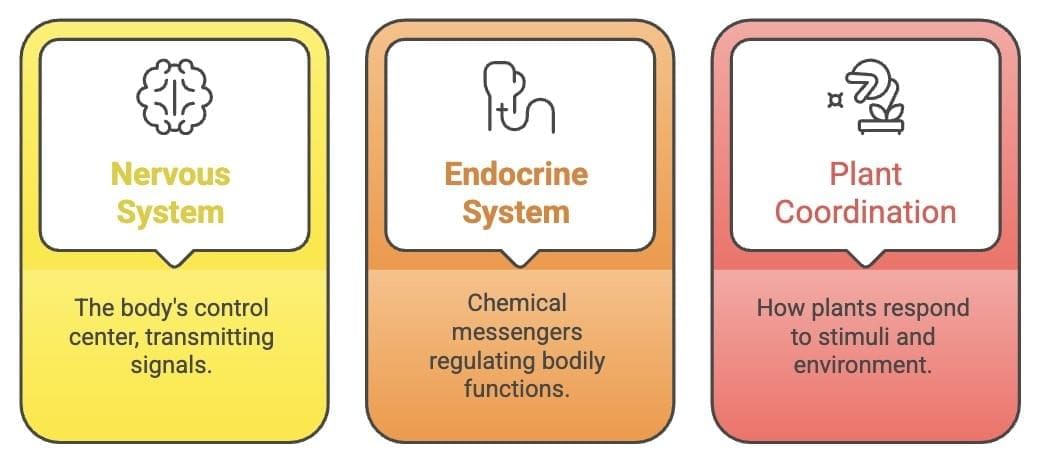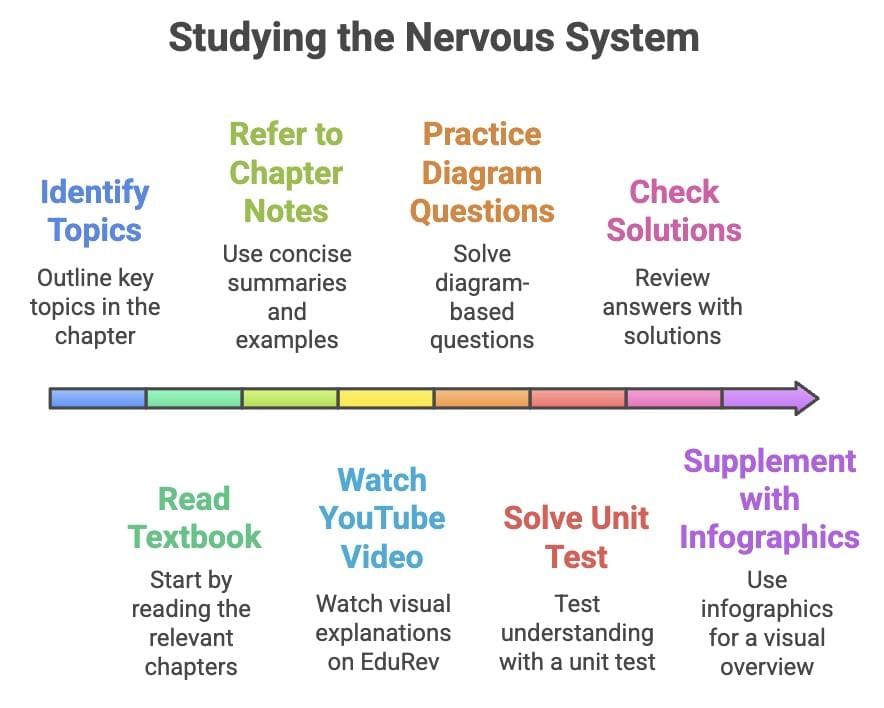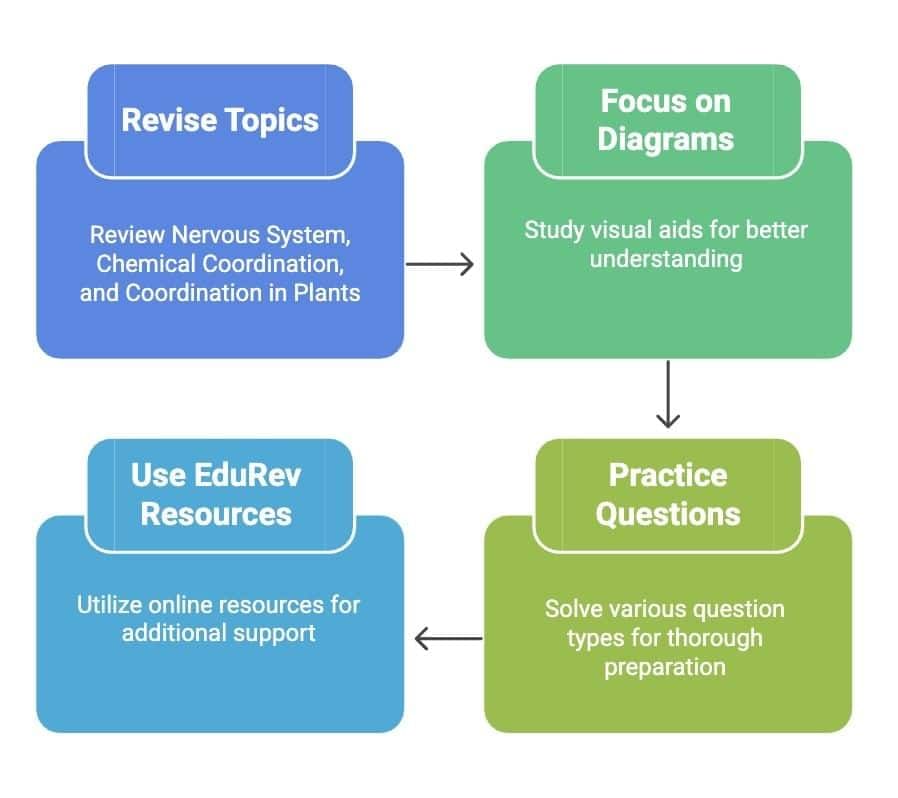4 Days Timetable: Control and Coordination | Science Class 10 PDF Download
| Table of contents |

|
| Topics to Cover |

|
| Day 1: Nervous System |

|
| Day 2: Chemical Coordination in Animals (Endocrine System) |

|
| Day 3: Coordination in Plants |

|
| Day 4: Revision |

|
| Additional Notes: |

|
The chapter on "Control and Coordination" is a crucial part of your Class 10 Science syllabus. This chapter explores how living organisms, both animals and plants, manage various functions and processes. To excel in your board exams, it's essential to grasp the concepts of Chemical Coordination In Animals - Endocrine System, Nervous Coordination In Animals, and Coordination in Plants. This study plan will guide you through these topics, ensuring you are well-prepared for your exams.
Note: You can adjust the timetable based on your pace, but try to stick to the overall pattern for comprehensive coverage.
Topics to Cover
Before we begin, let's outline the key topics in the chapter:
- Nervous System
- Chemical Coordination in Animals (Endocrine System)
- Coordination in Plants

Day 1: Nervous System
What to Cover:
- Basics of the nervous system and its role in control and coordination.
- Structure and functions of neurons, the central nervous system, and the peripheral nervous system.
- Reflex actions and their mechanisms.
- Human brain: Parts, functions, and role in coordination.
Study Tips:
- Start by reading the relevant chapters in the NCERT Textbook: Control & Coordination.
- Refer to the Chapter Notes: Control & Coordination on EduRev for concise summaries and examples.
- Watch the YouTube video Nervous System on EduRev for visual explanations.
- Practice diagram-based questions using Diagram Based Questions: Control and Coordination on EduRev.
- Solve questions from the Unit Test: Control and Coordination and check answers with Unit Test (Solutions): Control and Coordination to test your understanding.
- Supplement with Infographics: Nervous System for a visual overview.

Day 2: Chemical Coordination in Animals (Endocrine System)
What to Cover:
- In-depth study of the endocrine system and its role in chemical coordination.
- Major endocrine glands, their hormones, and functions.
- Role of hormones in growth, metabolism, and reproduction.
- Real-life examples of hormonal imbalances and their effects.
Study Tips:
- Review the NCERT Textbook: Control & Coordination for a comprehensive understanding.
- Study the Chemical Coordination In Animals - Endocrine System on EduRev for detailed notes.
- Explore the PPT: Control and Coordination on EduRev for visual aids.
- Practice categorising hormones and their functions using Practice Questions: Control & Coordination.
- Test your knowledge with the Test: Chemical Coordination In Animals on EduRev.
- Use NCERT Solutions: Control & Coordination to clarify doubts.
Day 3: Coordination in Plants
What to Cover:
- Understanding coordination mechanisms in plants.
- Types of plant movements: Tropic and nastic movements.
- Role of plant hormones (auxins, gibberellins, cytokinins, abscisic acid, ethylene).
- Practical applications of plant hormones in agriculture and daily life.
Study Tips:
- Carefully read the relevant sections of the NCERT Textbook: Control & Coordination.
- Explore the Mindmap: Control & Coordination on EduRev for a visual summary.
- Watch the YouTube video Control and Coordination on EduRev for conceptual clarity.
- Solve Case Based Questions: Control And Coordination to enhance problem-solving skills.
- Practice with the 10-Minute Test: Chemical Coordination In Plants to reinforce learning.
- Review Mnemonics: Control & Coordination for quick recall of key terms.
Day 4: Revision
What to Cover:
- Revise all topics: Nervous System, Chemical Coordination in Animals, and Coordination in Plants.
- Focus on diagrams, key terms, and processes.
- Practice solving various question types to ensure thorough preparation.

Study Tips:
- Go through the Short & Long Answer Questions: Control & Coordination on EduRev to recapitulate key concepts.
- Test yourself with Topic Wise tests like Test: Nervous & Muscular Coordination and Test: Central Nervous System In Humans on EduRev.
- Practice solving Very Short Questions: Control and Coordination, Worksheet: Control and Coordination, and Previous Year Questions: Control & Coordination to cover all question types.
- Use Flashcards: Control & Coordination-1 and Cheat Sheet: Control and Coordination on EduRev for quick revision.
Additional Notes:
In your Class 10 Science board exam, questions on "Control and Coordination" often involve diagrams, processes, and applications. The best way to prepare is by solving various question types, such as those from NCERT Exemplar: Control & Coordination and Solved MCQ Questions: Control & Coordination. Utilize EduRev resources like videos, notes, and infographics to strengthen your knowledge.
For comprehensive study materials, explore Class 10 Boards on EduRev. Specific resources for this chapter include:
Important Links:
- Class 10 Boards on EduRev
- Previous Year Questions
- NCERT Exemplar
- NCERT Solutions: Control & Coordination
- Infographics: Nervous System
Topic-Specific Links:
- Nervous System: Nervous System YouTube, Diagram Based Questions
- Chemical Coordination: Chemical Coordination In Animals - Endocrine System
- Coordination in Plants: 10-Minute Test, Mindmap
By following this structured study plan and regularly testing your knowledge with the interlinked resources, you can confidently tackle the chapter on "Control and Coordination" and excel in your Class 10 board exam.
Good luck!
|
80 videos|569 docs|80 tests
|
FAQs on 4 Days Timetable: Control and Coordination - Science Class 10
| 1. What is the role of the nervous system in animals? |  |
| 2. How do plants coordinate their responses to stimuli? |  |
| 3. What are the main hormones involved in animal coordination? |  |
| 4. What processes are involved in hormonal control in animals? |  |
| 5. Why is revision important in understanding control and coordination? |  |





















